K <<< Author: L >>> M
Jump to:
Bruce Lader |
Pamela L. Laskin |
Daniel Lawless |
Jennifer LeBlanc |
Susan Lewis |
Elizabeth Lund
Bruce Lader
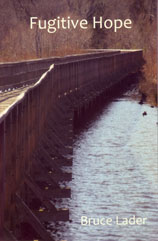 Fugitive Hope by Bruce Lader
Fugitive Hope by Bruce Lader
Červená Barva Press, 2014-
Bruce Lader is the author of four other volumes of poetry, most recently, Embrace (Big Table Publishing, 2010) and Landscapes of Longing (Main Street Rag Publishing, 2009). Discovering Mortality (March Street Press, 2005) was a finalist for the 2006 Brockman-Campbell Book Award. Winner of the 2010 Left Coast Eisteddfod Poetry Competition, his poems have appeared in Poetry, New York Quarterly, Confrontation, The Humanist, New Millennium Writings, Fulcrum, Harpur Palate, Against Agamemnon: War Poems anthology, and over 100 other magazines and anthologies. He has received a writer-in-residence fellowship from The Wurlitzer Foundation and an honorarium from the College of Creative Studies at UC-Santa Barbara. Formerly a Special Education teacher, he is the Director of Bridges Tutoring, an organization in Raleigh, North Carolina, educating multicultural students. His author Website is www.BruceLader.com.
Bruce Lader’s new collection, Fugitive Hope, begins with attractive, jazzy pizzazz and over four sections deepens, broadens, and sweetens, as a pastoral symphony might, into gratitude for life, nature, and his wife, who bears the mysteries of faith and hope. In the lovely “Hide & Seek,” the speaker is only “certain of this abracadabra / moment ludicrous with / giddy freedom.” Witty and cutting, “Memo from Another Planet” imagines Earth’s quick, quiet capitulation to conquest. Near book’s end, we are listening to “covert concerts in these woods,” and in “Vision of Uncertainty,” the poet dreams of seeing spring’s advent in his wife’s eyes after his death. It is an astonishing journey, beautiful and hopeful.
—Kelly Cherry, The Retreats of Thought: PoemsIn Fugitive Hope, Bruce Lader is an adept guide covering the vast territory of this fresh, lively collection. He offers compelling, sympathetic portraits of a wide range of individuals, from soldiers to judges, from Diogenes to Orpheus. A skilled craftsman, he knows just when to pull up at the end of his poems, put on the brakes, and send us flying.
—Jim Daniels, Having a Little Talk with Capital P PoetryThese are tightly structured, tightly controlled poems profuse with passion and a sometimes hidden but always savage lust for life, formed of "the legacy of gargoyle and...of cherubs hovered in balance."
—Jared Smith, The Collected Poems of Jared Smith: 1971-2011Review by CL Bledsoe: http://www.thepedestalmagazine.com/gallery.php?item=23664
$17.00 | ISBN: 978-0-9910091-8-3 | 81 Pages | In Stock
Pamela L. Laskin
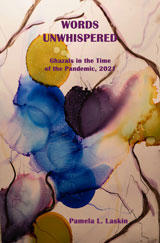 WORDS UNWHISPERED Ghazals in the Time of the Pandemic, 2021
WORDS UNWHISPERED Ghazals in the Time of the Pandemic, 2021
by Pamela L. Laskin
Červená Barva Press, 2023Pamela L. Laskin is a lecturer in the English Department at City College, where she teaches undergraduate and graduate Children’s Writing, and directs the Poetry Outreach Center. Several of her children's and poetry books have been published. Ronit and Jamil, A Palestinian/Israeli Romeo and Juliet in verse was published by Harper Collins in 2017, and was named among the 35 books to have on your radar for 2017. Bea, a picture book, was a finalist for the Katherine Paterson Prize for Children's Fiction in 2018. She is the winner of the 2018 International Fiction Prize from Leapfrog Press, and Why No Bhine, an epistolary novel about the Rohingya Muslims, was published in 2019. The Operating System published a bilingual picture book, Monster Maria, which is about Hurricane Maria, and is being used as a fundraiser for after-school programs in Puerto Rico. Linus Press published My Secret Wish about families seeking asylum, and is also being used as a fundraiser for Immigrant Families Together.
The Lost Language of Crazy, a middle grade-novel, was published in November, 2021 (Atmosphere Press). She is currently at work with Ukrainian author Vasyl Makhno on a YA novel in verse, Wisteria and Weeds, whose focus is on the war in the Ukraine, and what it means for the lives of teens.
Finally, she is this year's (2023) recipient of Judith's Room Freedom Through Literacy Board option prize for her current novel.
Follow her: twitter@RonitandJamil and follow her blog: http://PamelaLaskin.blogspot.com
Pam Laskin's WORDS UNWHISPERED: Ghazals in the Time of the Pandemic, 2021 is a stunning collection that documents the emotions, challenges, and fears that existed during the height of the pandemic. No topic is taboo here; love, death, longing, politics, family and isolation all appear in this haunting collection. There is a subtle melody and musicality underlying this extraordinary collection; a silent force that is a gift to her readers. Laskin herself reminds us of the gift of her poetry "the music melts my heart/in songs of ghazals/so every day I write/the gift of ghazal."
—JP Howard, author of SAY/MIRROR"WORDS UNWHISPERED is a reminder of the importance of the ghazal being an ancient Arabic verse that deals with grief and loss. Laskin's accomplishments in this area of grief and loss reminds the reader of "Remembering the Fireflies," when Laskin concludes the stanza with, "Like a hemorraged rose." I have read the ghazals by John Hollander, Adrienne Rich and Patricia Smith, but Laskin stands among the greats."
—Robert Anthony Gibbons, author of Flight and Close to the TreeCover Art: Elissa Cohen
$16.00 | ISBN: 978-1-950063-97-0 | 60 Pages
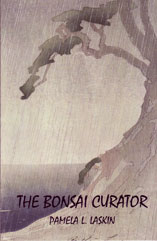 The Bonsai Curator by Pamela L. Laskin
The Bonsai Curator by Pamela L. Laskin
Červená Barva Press, 2013-
Pamela L. Laskin is a lecturer in the English Department, where she directs the Poetry Outreach Center. Poetry collections include: Remembering Fireflies and Secrets of Sheets (Plain View Press), Van Gogh’s Ear (Červená Barva Press), Daring Daughters/Defiant Dreams (A Gathering of Tribes), and The Plagiarist (Dos Madres Press). Several children’s books have been published.
In The Bonsai Curator, through metaphor, myth, and fairy tale, Pam Laskin chronicles a life, from the figurative museum, into the woods, then out of that museum, into the world. But my favorite moments live in her language and imagery, like: “The pines, bamboo, and plum trees... from the same father, / a recluse / who made his children lovely, / but lonely.” / and “I am good at stunting growth; / I’ve kept myself / five forever.” As always, Laskin doesn’t blink, and she doesn’t flinch, either.
—Estha WeinerIn this subtly complex collection of poems, Pam Laskin takes the image of bonsai—stunted and scarred into beauty through deliberate human artifice—and makes it a metaphor of being mothered, smothered and “wretchedly loved.” Then with great deftness, she uproots the image and offers us a fresh and expansive vision of a tree, one that summons us to the sprawling beauty of parenting—and of poetry—that is nurtured in respect and love.
—David Groff, Author of CLAY
Bonsai Beauty
I have been birthed/unearthed
from air,a mutation
my odd, atrophied limbs
are startling.Like a fixture I stand
paralyzed
by motherless memories.Yes, there is a tree here
$17.00 | ISBN: 978-0-9883713-5-4 | 72 Pages | 7 in Stock
but at fifty
I still can't grow.
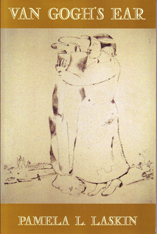 Van Gogh's Ear by Pamela L. Laskin
Van Gogh's Ear by Pamela L. Laskin
Červená Barva Press, 2009-
Pamela L. Laskin, a teacher, writer, cyclist, swimmer and avid reader, has had many poems, short stories and children's stories published in journals and magazines. She is a lecturer in the English Department at The City College, where she directs The Poetry Outreach Center. Central Station, her first book of poetry, was the winner of the Millennium Poetry Prize. Remembering Fireflies, her second collection, was published by Plain View Press, and Ghosts, Goblins, Gods and Geodes, her third collection, was published by World Audience Press. In 2009, Plain View Press published her fourth collection, Secrets of Sheets. Three poetry chapbooks, five picture books and two young adult novels have been published as well. She edited a collection of original fairy tales, The Heroic Young Woman, published by Clique Calm Books. She lives in Brooklyn, New York with her husband, Ira, while her children, Craig and Samantha, are away at school completing their degrees.
Pamela Laskin is equally able to grasp the big picture -- “born/ out of millions of years/ of old thumbs and cortexes” -- as well as the small, luminous detail. She writes with vivid immediacy about the people and places around her, so that each poem, “Each bead is like the cell of a body/ passing through a busy street/ on a quiet day.” It is a pleasure to spend time with and have one’s senses sharpened by this book.
-Elaine EquiPamela Laskin’s new poems move richly and swiftly through memory and presence, through family, romance, friendship, and art, through Brooklyn and the rest of the world. They are passionate, quiet, thoughtful, intelligent. I want to say there is something modest about them, but it’s the modesty of someone who knows she knows and will lift the screen for a second if only to see if you can figure it out. Van Gogh’s Ear is a fine and generous collection.
-Mark StatmanIn a Glass Ball
Clouds stuck in the sky
summer has evaporated
anorexic trees,
children gone from the streets.Soon I will be snowed under
as I am, perhaps, already
staring out the windowlike the woman trapped in a glass ball
which people turn over, indiscriminately
watching the tiny flakes
scatter haphazardlyobserving
$15.00 | ISBN: 978-0-578-04084-4 | 74 Pages | In Stock
the unsettling appearance
of a woman
going nowhere.
Daniel Lawless
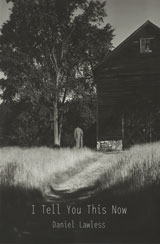 I Tell You This Now by Daniel Lawless
I Tell You This Now by Daniel Lawless
Červená Barva Press, 2024-
Daniel Lawless is the author most recently of The Gun My Sister Killed Herself With. Recent poems appear in FIELD, Barrow Street, Prairie Schooner, Ploughshares, Poetry International, Los Angeles Review, upsteet, SOLSTICE, Manhattan Review, Massachusetts Review, JAMA, and Dreaming Awake: New Prose Poetry from the U.S., Australia, and the U.K., among others. A recipient of a continuing Shifting Foundation grant, he is the founder and editor of Plume: A Journal of Contemporary Poetry, Plume Editions, and the annual Plume Poetry anthologies.
Daniel Lawless' extraordinary new book I Tell You This Now dazzles with poetry's strange power—"negative capability"—the courage to be vulnerable even in the moment of insight, to work at the threshold where the self ends and the street begins, to be the animal that knows it will die. It's an anarchic power that subverts all authority, including the speaker's. Adamant in their modesty, generosity, and ferocity, these poems can critique the absolutes—the giving of names ("Daniel"), the arc of time ("Sleek Green Car"), emptiness itself ("Ullage"). Always these poems speak to the real, the loved, the broken. Always the work is haunted by the injustices we suffer and inflict in a world which is collapsing inwards—"your dead father who is beautiful like Quang Duc setting himself aflame." Lawless' poems are wild, but search for a way to be responsible in a time of chaos. They live on the breath, but they bear the charge of a lifetime. Lawless is a visionary, a craftsman, and a terrific poet.
—D. NurkseWhen I read Daniel Lawless's poetry, I feel as if I am in the presence of an understated visionary. Deeply personal, his poems move on two levels— they are both in the world and looking down at it, as from above. They are poems of the ordinary and of a soul seeking redemption. They are poems of memory and suffering, longing as well as of celebration, insight and blessing. I am in awe of this poet and of this ingenious and luminous collection, I Tell You This Now.
—Nin AndrewsThe poems in Daniel Lawless' I Tell You This Now evoke the photos of Diane Arbus in that they might make you want to turn away, but then only to turn back and go deeper, as he does, to find the humanity in this complex, difficult world. He mines photographs both real and imagined to create fresh, startling insights that sustain us, like the small daily joys of "...lumbering the cha-cha as she boiled the green out of Thursday cabbage." The collection unspools in one long, magnificent section-nothing to slow down or stop the accumulating momentum of these brilliant flashes. They're like old flashbulbs that briefly blind us as they sear into our consciousness. Death and illness hover over this book, as they hover in our lives, even as we hurtle ourselves forward. As Lawless writes, "how the dead live on/These scraps of memory we feed them like dogs./Always hungry, come-calling us by their name." There's a brilliant darkness to these poems that are full of light.
—Jim DanielsCover Art: Barn, Lake George (1936) by Alfred Stieglitz. Original from The Art Institute of Chicago.
$18.00 | ISBN: 978-1-950063-80-2 | 55 Pages
Jennifer LeBlanc
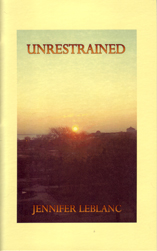 Unrestrained by Jennifer LeBlanc
Unrestrained by Jennifer LeBlanc
Červená Barva Press, 2009-
Jennifer LeBlanc is currently pursuing a B.A. in English from Regis College in Weston, Massachusetts. Her book Coloring the Shadows (2009) won the Mary C. Bryan Women's Studies Award for 2009, and she represented Regis College at the 2009 Greater Boston Intercollegiate Poetry Festival. She is an editor of Regis College's literary journal, Hemetera, and her poetry has been published in Bolts of Silk, Oak Bend Review, and Up the Staircase, among others.
$7.00 | 28 Pages | In Stock
Susan Lewis
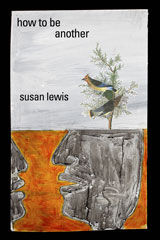 How to be Another by Susan Lewis
How to be Another by Susan Lewis
Červená Barva Press, 2014-
Painting by Melissa Stern
Susan Lewis lives in New York City and edits Posit (www.positjournal.com). Her other books and chapbooks are This Visit(BlazeVOX [books], 2014), State of the Union (Spuyten Duyvil Press), The Following Message (White Knuckle Press), At Times Your Lines (Argotist e-books), Some Assembly Required (Dancing Girl Press), Commodity Fetishism, winner of the 2009 Cervena Barva Press Chapbook Award, and Animal Husbandry (Finishing Line Press). Her work has been nominated for the Pushcart Prize and published in a great number of journals and anthologies, including Berkeley Poetry Review, BlazeVOX, Cimarron Review, The Journal, The New Orleans Review, Phoebe, Raritan, Seneca Review, Verse (online), and Verse Daily.
Susan Lewis poses questions that are sine waves amid the urban ruckus of unsweetened yet unnatural nouns. She nuzzles the vibrato context that her poems would recast. Poetic prophecy thrives amid a balance between selected, anchored logic and prevailing, accurate illogic in the midst. There is a delicious sense of understatement in these poems that drive toward the surprise end of the spectrum that diverts from expectation. Along this welcome string of mysteries, we are perpetually challenged to invent new steps.
—Sheila E. MurphyClipped, cut, cajoling, the prose bits of Susan Lewis are pure poetry. When and whether she unravels the endless to and fro with an/other who never quite makes true contact, or provides procedural instructions on how to be some self, she never spins anything less than "the courage to tell us something new, no matter how frightening or untrue." Her capsuled narratives cohere and dissolve with the piquant absurdity of the voices they refract, then send back out into the ether. This is the kind of entropy "we might as well learn to ride like the wind" to whatever full-stop it takes us, with fun and thanks punctuating our language-voyage.
—Amy KingWaking headlong transcriptions of what poetry's dream can do that no other form of writing can: sing condensed quicksilver improvisations that are any smart feeling reader's sought after letters to the Other you too can learn to become from out a "most entertaining cave." Read these poems and be right back in the new present unfurling moment of language's immediacy—each poem is a successful risk-taking trip flying in and out of Susan Lewis' brilliancy. Rx: read this book.
—Lee Ann BrownSusan Lewis' poems in How to Be Another offer often ironic, always eloquent testament to the agonies of relationships in general and couples in particular. Wielding incisive metaphors like a scalpel, she cuts through social poses and masks to the messy failures and disappointments that lurk underneath the surface of our all too human interactions. Her poetry is compassionate enough to capture our desire to connect with each other and wise enough to recognize our repeated and heartbreaking failure to do so.
—Howard Good
Reviews:
http://galatearesurrection26.blogspot.com/2016/07/how-to-be-another-by-susan-lewis.html
Interview with Susan Lewis by Rob Mclennan on Rob Mclennan's Blog:
$17.00 | ISBN: 978-0-9910091-0-7 | 81 Pages | In Stock
http://www.robmclennan.blogspot.ca/2014/02/12-or-20-second-series-questions-with_15.html
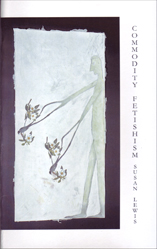 Commodity Fetishism by Susan Lewis
Commodity Fetishism by Susan Lewis
Červená Barva Press, 2010-
Winner of the 2009 Cervena Barva Press Poetry Contest
Susan Lewis is the author of "Animal Husbandry" (Finishing Line Press, 2008). Her poetry and fiction have appeared in numerous print and online journals, including Atlanta Review, Berkeley Poetry Review, Cimarron Review, The New Orleans Review, Phoebe, Raritan, Seneca Review, So To Speak, Verse, and Verse Daily. Her collaborations with composer Jonathan Golove have been performed at such venues as the Kennedy Center and Carnegie's Weill Hall.
Cold ontology and normative longing have met their antidote in these derivations of bright oughts from the imperfect is – progressions as hopeful as they are rigorous. Welcome to the unknowable nursery of tomorrow’s big payoff, the source of all tantalizing hypotheticals. Here even the schism between practitioners and their actions is not mere disconnect, it’s the animating principle that gives us room to evolve. Welcome to Susan Lewis’ genesis in the retort, lush with secret memes of closed door intimacy.
–Brendan Lorber, Editor/Publisher, Lungfull! MagazineCommodity Fetishism is at once a verbal collage of the mental rigamarole of daily living and a compendium of irony and sentiment. These poems are terse yet opaque, jokey yet unapologetically consequential. This chapbook is off-beat, perfectly tuned, and compulsively readable.
–Wayne Thomas, Editor, The Tusculum Review
COMMODITY FETISHISM
Because he abhorred the notion of work, the young man turned his home into a museum, offering his life as the sole exhibit. Although at first there were few visitors, the curious were given to repetitive, even compulsive, attendance. Soon their devotion became contagious, and the museum's patrons grew in number, especially as the exhibits explored themes such as Restless Yearning, Acceptance, and Doubt. By the time Reexamination was put up, scores of disappointed viewers had to be turned away. When Resignation made way for Peaceful Detachment, the public rioted, insisting that the museum never close. Tearful strangers mobbed the old man with their grief and unreasonable need, forcing him to retreat the only way he could.
$7.00 | ISBN: 978-0-692-00642-9 | 34 Pages | In Stock
Elizabeth Lund
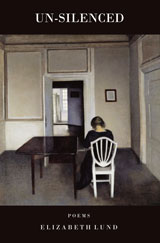 UN-SILENCED poems by Elizabeth Lund
UN-SILENCED poems by Elizabeth Lund
Červená Barva Press, 2023-
Elizabeth Lund is the award-winning host of Poetic Lines, which features in-depth interviews with established and emerging poets. She also covers poetry for major publications, including The Christian Science Monitor, where she edited poetry for ten years. From 2015 through 2019 she wrote a monthly poetry column for The Washington Post. Her own poems have appeared in the US, the UK, and Canada. She has read and appeared at a variety of festivals, most recently the Gaithersburg Book Festival, where she served as the final judge for the 2020 high school poetry contest.
Long before 2020, when the world began grappling with a pervasive pandemic that resulted in widespread personal isolation, another type of malevolence locked many women inside their homes. These poems address the devastating effects of domestic violence and seek to restore one victim’s voice, allowing her to speak to and through another generation of women.
Poetry is one of the few art forms that enables us to approach extremely difficult and complex human experiences without having to turn to didacticism or preaching. Lund’s poems do this exquisitely as they grapple with the intense emotions of a woman trapped in an abusive relationship. Each poem is a compelling piece of a much larger puzzle - one that explores the effects of toxic masculinity and the debilitating fallacy that a woman can free her abuser from his own darkness.
With the concision of Emily Dickinson who taught us to "tell all the truth but tell it slant -," and a stream of consciousness narrative, Lund creates the perfect modality to convey an intense and painful journey that generations of women have experienced.
The result, Un-Silenced, is an absolutely stunning, heart-rattling read that implores us to open our hearts and minds.
-Michael S. Glaser, Poet Laureate of Maryland 2004-2009A gunshot is fired. Police are called. One could say the sky/turns a deaf ear. In this powerful collection, Elizabeth Lund, the omnipresent speaker, honors a beloved aunt and casts light on other women who have suffered domestic abuse. Through poignant narrative and lyric fragments, Un-Silenced takes us deep into a culture that perpetrates violence against women. Lund gives these women the dignity they deserve while finding solace and closure to her own familial pain. This is a major debut of an authentic, compassionate voice! May all who have been harmed or are in harm's way, directly or indirectly, be blessed by this book's presence in the world.
-Dzvinia Orlowsky, author of Bad Harvest and SilvertoneElizabeth Lund has captured the sorrow and malevolence of our times in lyrics that are unsparing, mysterious, and defiantly beautiful. I was captivated from first page to last.
$18.00 | ISBN: 978-1-950063-79-6 | 60 Pages
-Hilary Holladay, author of The Power of Adrienne Rich: A Biography
Home | Červená Barva Press Books | Poetry Chapbooks | Poetry Books | Anthologies | Fiction | Flash Fiction | Literary Journals | Non-fiction | Plays | Memoirs | Used Books | Audio CD's
